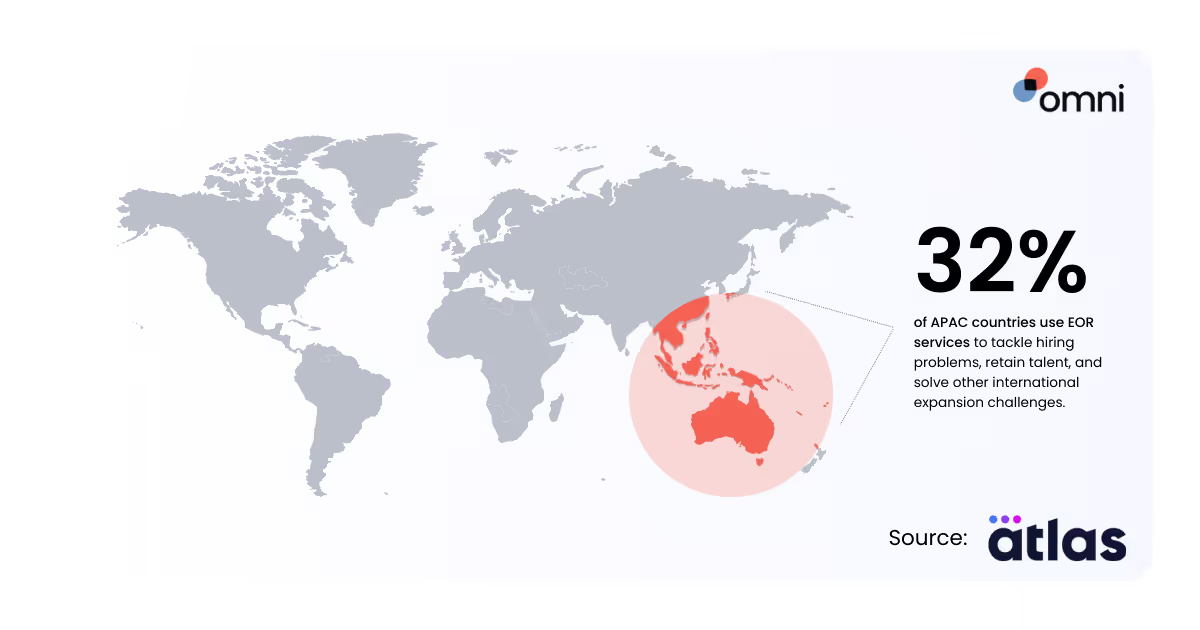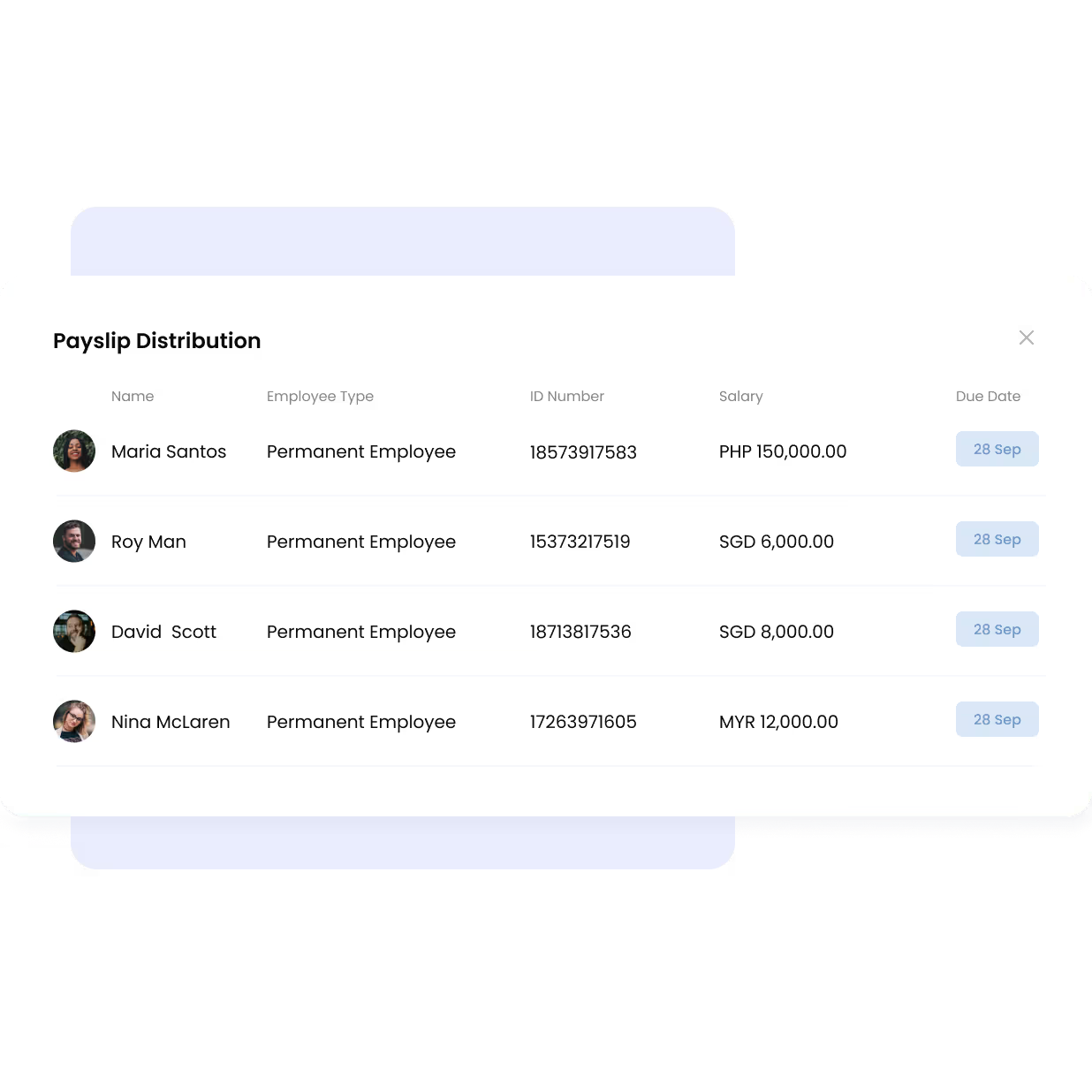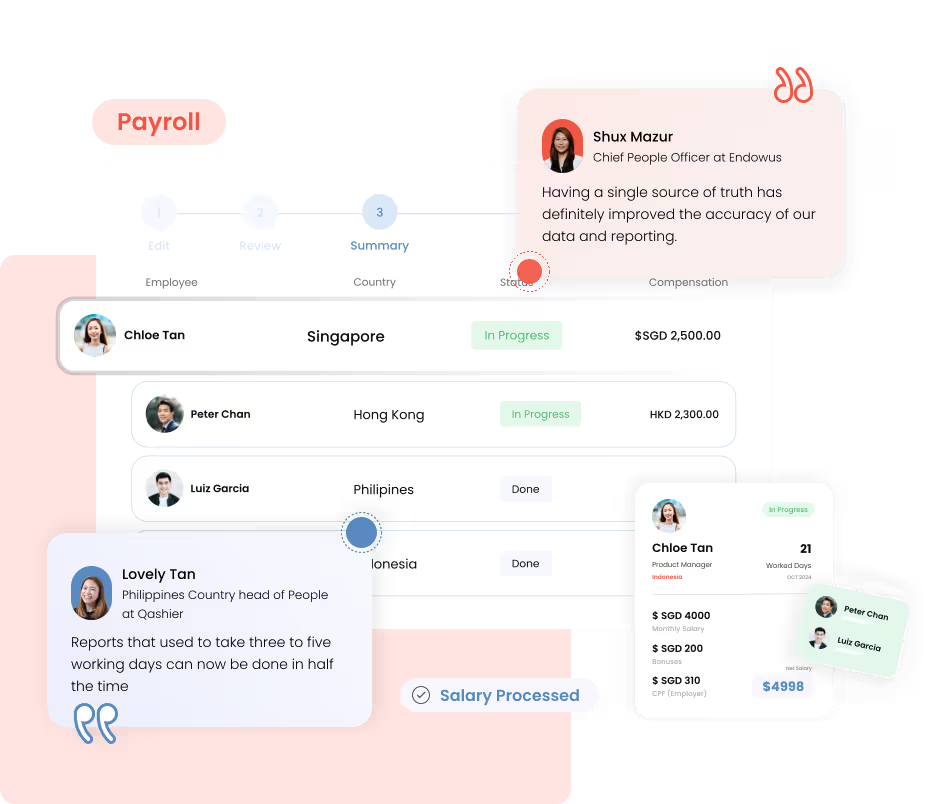Summary. Singapore and Malaysia offer attractive but distinct business environments for Southeast Asian expansion. Singapore provides robust legal frameworks and skilled talent, while Malaysia offers cost-effective workforce solutions with varying regional regulations. An Employer of Record (EOR) service streamlines expansion to both countries by handling compliance, payroll, and workforce management without establishing legal entities. EOR benefits include faster market entry, full legal compliance, simplified HR management, cost efficiency, and hiring flexibility. Companies should consider industry alignment, employment culture, and economic stability when choosing between markets.
Singapore and Malaysia are prime markets for business expansion in Southeast Asia. Both countries offer business-friendly environments with low corporate tax rates and a skilled English-speaking workforce. Despite these favorable business conditions, hiring in both regions presents challenges, including complex labor regulations, varying cultural expectations, and costly local entity setups.
To overcome these hurdles, many companies partner with an employer of record Singapore & employer of record Malaysia (EOR) when expanding to both countries. These third-party organizations streamline the hiring process, manage compliance, and provide faster market entry without the burden of establishing a legal entity. In fact, 32% of Asia-Pacific (APAC) countries use EOR services to handle hiring, talent retention, and other global expansion challenges.

This article covers the intricacies of global employment Singapore and Malaysia. Whether your goal is to hire local talent or reduce compliance risks as you expand, you’ll see how an EOR can simplify your expansion strategy and support your business growth.
The Employment Landscape in Singapore and Malaysia
In 2022, Southeast Asia had a gross domestic product (GDP) of over USD 3.6 trillion. Malaysia and Singapore are two key contributors to this massive growth. Although the two countries share cultural similarities, their business environments differ in several ways. Below, we explore these key differences to note when using employer of record Singapore & employer of record Malaysia:
Overview
Singapore
Singapore is a high-income economy with a robust legal framework, excellent infrastructure, and a highly skilled workforce. With a labor force participation rate of 68.2%, the country is an attractive destination for multinational companies expanding in the APAC region. On top of that, Singapore ranks as the top destination for operational efficiency in the World Bank’s Business Ready 2024 report. It also leads globally in human capital development, according to the Human Capital Index.
However, Singapore’s strict labor standards can pose challenges for foreign companies. Regulations such as the Employment Act, Central Provident Fund (CPF), Personal Data Protection Act (PDPA), and the Tripartite Guidelines on Fair Employment Practices (TGFEP) set complex compliance requirements regarding working hours, overtime pay, and employee rights protection.
To avoid noncompliance risks like hefty fines and penalties, many companies use an employer of record Singapore for compliant hiring and payroll management.
Read next: HR's Guide to Managing Singapore Employment
Malaysia
Malaysia's economy has grown rapidly, significantly reducing poverty over the years. According to a joint report from the World Bank and the Ministry of Economy, the country is projected to achieve high-income nation status between 2028 and 2030. Malaysia has also ranked third in the 2021 and 2023 Global Services Location Index (GSLI), reinforcing its position as a top service provider for global businesses. With a labor participation rate of 70.6%, Malaysia offers access to a competent and diverse talent pool.
The country’s flexible labor laws further enhance its appeal to businesses seeking cost-effective expansion. For example, the Employment Act allows employees to request Flexible Working Arrangements (FWAs), supporting work-life balance. Additionally, Malaysia offers tax incentives to foreign companies, creating high-value jobs and opportunities for locals. However, the country’s regulations vary between Peninsular Malaysia, Sabah, and Sarawak. As such, companies must understand each zone’s requirements to ensure compliance.
Labor law differences
Singapore
The Employment Act mainly governs Singapore’s labor market. It covers the basic terms and working conditions for all employment types, including part-time, contract, and temporary. For example, the act stipulates that employees are entitled to 11 days of paid holiday and overtime pay of at least 1.5 times their basic hourly rate. But while the Employment Act applies to both indigenes and foreigners working in Singapore, some sections, like work hours and rest days, don’t apply to managers and executives.
Furthermore, all foreigners looking to work in Singapore must have a valid work permit before they start work. This includes the Employment Pass, Entre Pass, and S Pass. Each pass has eligibility requirements, including qualifying salaries, specified documents, and professional qualifications.
Malaysia
The Employment Act 1955 is Malaysia’s main labor legislation, regulating working conditions, minimum wage, benefits, employee rights, and protection against unfair dismissal. It only covers Peninsular Malaysia and applies to local and foreign employees, excluding domestic workers and civil servants.
Under the Act, employees are entitled to various statutory benefits, including annual leave, sick leave, maternity leave, and public holidays. Employers and employees must also contribute 13% and 11%, respectively, to the Employees Provident Fund (EPF), depending on the employee’s age grade.
Furthermore, notice periods for termination vary depending on service years. For example, an employee with less than two years of service is entitled to at least four weeks’ notice. Additionally, expatriates looking to work in Malaysia must obtain the necessary work permits (Employment Pass, Professional Visit Pass, or Dependent Pass) based on their job type and skill level. Employers must also apply for a Visa With Reference (VDR) before the expatriate enters the country.
Business set up and HR compliance
Singapore
Establishing a business and hiring in Singapore is straightforward. First, you must register with the Accounting and Corporate Regulatory Authority (ACRA) as a private limited company, sole proprietorship, partnership, or representative office (RO).
Incorporating your company with ACRA offers access to government aid, such as Singapore's Overseas Market Immersion Programme (OMIP) and Enterprise Singapore grants. It also improves employer branding, making it easier for customers and potential employees to identify and transact with your business. However, strict compliance with employment regulations is essential, especially regarding work permits, data protection, fair employment practices, and levies.
Learn more: Expanding Globally with an EOR: A Step-by-Step Guide
Malaysia
Businesses seeking a Malaysian presence must register with the Companies Commission of Malaysia (SSM). First, specify your business structure—private limited company, branch office, public limited company, partnership, sole proprietorship, or representative office. Then, choose a business name that aligns with SSM requirements. Afterward, submit the required documents for registration to SSM, including your business plan, passport, visa, and other company documents.
While setting up a business in Malaysia is flexible, companies must adhere to various state and federal laws. States like Sabah and Sarawak have labor laws different from those of Peninsular Malaysia. These variations affect each zone's employment terms, statutory contributions, and compliance requirements.
Taxation differences
Singapore
All Singapore-sourced income is taxable at a flat rate of 17%, the lowest among ASEAN states. However, on January 1, 2025, the country introduced a 15% minimum effective tax rate for large multinational enterprises (MNEs) with an annual revenue of €750 million or more. Singapore also has double tax treaties (DTTs) with other countries, such as India, Australia, Ireland, the Philippines, Rwanda, and Austria.
Additional reading: Employers’ Manual for Taxation in Singapore
Malaysia
The country adopts a territorial tax system, taxing residents and non-residents only on Malaysia-sourced income. Foreign income is tax-free unless your company operates in banking, insurance, airlines, or shipping. The standard corporate tax rate is 24%, while companies with paid-up capital of RM2.5 million and a gross business income of not more than RM50 million are taxed at the following rates:
Benefits of Using an Employer of Record Singapore
Using an employer of record Singapore and an employer of record Malaysia offer various perks to companies, including:
Fast market entry
An employer of record Singapore help companies hire employees without establishing a subsidiary or branch office. They act as the legal employer of your staff, securing work permits, paying, and administering benefits and statutory deductions. By bypassing the time-consuming and costly incorporation process, an EOR empowers businesses to enter the Singaporean market quickly and efficiently while keeping operational costs low.
Full legal compliance
An employer of record Singapore is well-versed in the country’s labor laws and tax regulations. This expertise enables them to handle global hiring compliantly, preventing penalties, reputational damage, fines, or employee dissatisfaction.
HR and payroll management
An employer of record Singapore handles payroll processing, tax withholdings, and social security contributions according to Singapore’s regulatory standards. For example, they pay salaries at least seven days after the end of a salary period. They also deduct 17% and 20% of employers’ and employees’ wages, respectively, to the CPF fund. This careful attention to detail ensures accurate and compliant payroll management.

Omni offers a global solution tailored for Asian businesses. Our expert support and multi-country payroll features help you manage your distributed workforce efficiently, ensuring compliance with local laws and regulations in 190+ countries and 10+ languages.
With dedicated payroll experts across the region and built-in calculators for country-specific requirements (like Singapore’s CPF or Malaysia’s PCB), Omni helps support multi-country payroll operations with proactive updates on regulatory changes. Structured documentation storage and automated reporting tools help HR teams stay on top of regulatory deadlines, compliance requirements, and audit trails for standardized and compliant reporting.
Cost efficiency
An employer of record Singapore and an employer of record Malaysia offer cost-effective alternatives to companies seeking global employment Singapore and Malaysia. It eliminates the need to set up a branch office or subsidiary company, significantly bypassing incorporation expenses. Additionally, it relieves businesses of recurring administrative burdens, such as registration fees, office costs, recordkeeping, and ongoing compliance obligations, leading to lower accounting and payroll costs.
By ensuring full compliance with Singapore’s labor laws, an employer of record Singapore and an employer of record Malaysia also minimize the risk of costly fines, legal disputes, and other penalties that can disrupt business cash flow.
Grow your team without the hassle or cost of a business entity set up with Omni’s Employer of Record (EOR) features, pay contractors and employees across borders with our managed payroll and integrate with your favorite tools for seamless communication as you grow.
Benefits of Using an Employer of Record Malaysia
Cost-effective labor
An employer of record Malaysia enables companies to test the market and scale operations without the long-term commitments of local entity setups. Instead of spending on company registration, legal fees, office space, and other overhead costs, businesses can hire employees directly through the EOR’s established entity and reduce expansion costs significantly.
Simplified employee management
An employer of record Malaysia handles all human capital management activities, including hiring, payroll, benefits administration, talent development, and data protection. This outsourcing frees up internal HR teams, allowing companies to focus on core business operations. For example, they apply for visas, draft employment contracts, and monitor performance on behalf of your organization while you retain total control over your workforce in your base country.

As your organization’s single source of truth, Omni provides a secure, digital record to centralize all documentation—from employment contracts to employee handbooks. With cloud-based storage backed by end-to-end encryption, Omni’s document management makes retrieval simple and instant. Role-based access controls help ensure only authorized employees have access to sensitive information, and approval workflows allow your team to route contracts and offer letters for e-signature and review with 360-degree visibility.
Local expertise and compliance
An employer of record Malaysia thoroughly understands the Malaysian regulatory landscape. They stay updated with federal and state labor laws and tax regulations. Additionally, they’re familiar with the country’s local customs, culture, and business practices.
This expertise enables them to navigate complex legal and cultural nuances when recruiting internationally. For instance, they deduct statutory contributions according to EPF’s and the Social Security Organization’s (SOCSO) specified rates. They also have established networks and resources to facilitate the smooth hiring of Malaysian top talent.
Flexibility in hiring
Partnering with employer of record Singapore & employer of record Malaysia empowers businesses to scale their workforce up or down on a short-term or project basis. It allows you to hire full-time, part-time, or even freelance employees without worrying about misclassifications, payment methods, and other legal expectations that come with global hiring. Ultimately, it empowers companies to tap into a skilled workforce and remain responsive to market demands without handling recruitment, work permits, or onboarding.
"[With Omni], we've been able to reduce our onboarding time from one week to three days."
— Arissa Wong, People Operations at Endowus
Read here: Endowus Optimizes Global Workforce Management with Omni
Key Considerations for Employer of Record in Singapore vs Malaysia
If you’re considering to partner with an employer of record Singapore or an employer of record Malaysia, there are a few things you need to be aware of:
Industry considerations
- Singapore is ideal for tech startups, finance, and global businesses looking to tap into a highly skilled, multilingual workforce. The country ranks eighth as the preferred work destination globally, as the Decoding Global Talent 2024 report highlights.
- Malaysia is more attractive for manufacturing, customer service, and industries looking to benefit from lower labor costs. The country offers access to a cost-effective workforce ideal for factories, call centers, and supply chain operations. Furthermore, the Malaysian government also provides tax incentives, which help to reduce operational overhead.
Employment culture
- Singapore is a highly competitive job market where employees value stability, work-life balance, and professional growth opportunities. Government initiatives such as OMIP encourage upskilling employees, making professional development necessary for international expansion.
- Malaysia: When using an employer of record Singapore & employer of record Malaysia, remember the country has a culturally diverse workforce with different regional expectations and communication styles. Companies must understand the distinct labor practices as employment laws and workplace norms vary by region.
Economic stability
- Singapore is known for its political and economic stability. The country also has a stable currency, investor-friendly regulations, and a transparent legal system, making it a secure environment for long-term investments.
- Malaysia: While generally stable, Malaysia’s economy is influenced by global market fluctuations in industries like manufacturing, electronics, and commodities. Additionally, changes in export demand, industry trends, and geopolitical shifts can affect business operations differently.
To support investment and free movement of goods between Singapore and Malaysia, on 7 January 2025, the governments of both countries announced the Johor-Singapore Special Economic Zone (JS-SEZ). Through this initiative, companies expanding with an employer of record Singapore and an employer of record Malaysia can leverage the provided tax incentives to lower operational costs and increase profits.
Make Global Employment Easy with Omni

With Omni EOR services, it’s easy to support your international workforce across multiple countries, time zones, and currencies.
Our centralized document management solution makes gathering the necessary data required to apply for employment passes, statutory contributions, and other country-specific initiatives seamless and timely. With customized workflows and automated reminders, HR can help empower employees to manage the deadlines and documentation requirements for applications. And centralized documents and real-time data make it easy for employees to access salary information and produce reports and documents necessary for verification.
"As a seasoned user of various HR software, I’ve found Omni’s level of attention and dedication in assisting their customers surpasses countless reputable HR providers in the market. Omni truly understands the challenges HR professionals face, and their platform is perfect for any fast-growing companies looking to resolve modern HR problems."
— Bilal Waris, Head of People & Culture at Wagely
Read more: See how Omni’s solutions saved 40% of time for Wagely
Offering a comprehensive payroll solution tailored to various countries specific requirements with features like support for SGD and MYR; automated tax calculations; and managed contributions, Omni can help HR teams simplify their payroll processing and ensure compliance with ease.
Additionally, Omni’s customizable dashboard allows your teams to set and manage calendars pre-loaded with country- or region-specific holidays and time zones, seamlessly recruiting and onboarding individuals in various locations.
Book a demo with our team to learn more about how Omni can support and grow your distributed team.
Full HR & Payroll coverage for Philippines, Singapore, Malaysia, Hong Kong, and Indonesia. Each market has local support teams and built-in compliance features.
Starting at $3/employee/month for core features. Volume-based discounts are available for growing teams. Book a demo for custom pricing.
Enterprise-grade security with ISO 27001, GDPR certifications, and local data residency options.
4 weeks average. Includes free data migration, setup, and team training. No hidden fees.
Built specifically for Asia with local payroll processing, same-day support in Asia time zones, and 40% lower cost than global alternatives.




.avif)
-min.avif)


